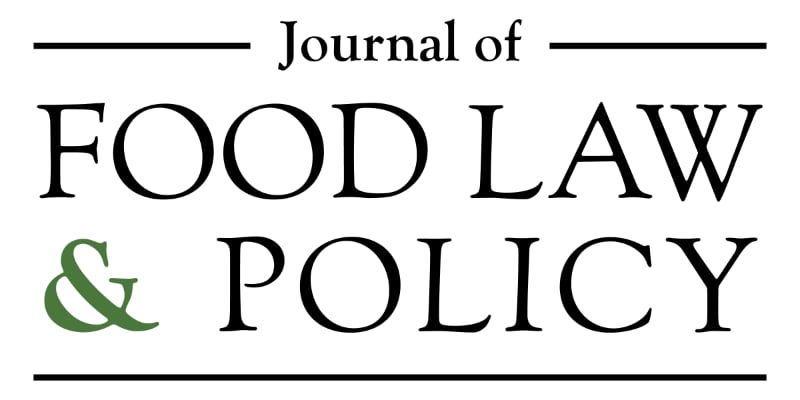Article
Margie Alsbrook
Twenty years after the Journal of Food Law & Policy published its first issue, I find myself looking back with deep gratitude for the people who helped create it, for the students who sustained it, and for the community that continues to make it thrive. What began as an untested idea has grown into a respected publication and a cornerstone of a still-growing field. This essay is both a reflection on that journey and a heartfelt thank-you to everyone who made it possible.
Article
Denis Stearns
This article can serve a function as a concluding section—a kind of coda—for issues addressed in greater depth by the author (Denis Stearns) before.
This article also allows Sterns to return to a central question that prompted his thought-journey in the first place: Why does the food in this country continue to be so unsafe, despite all of the laws, all of the enforcement efforts, all of the food safety advocacy, and all of the lawsuits filed to recover damages on behalf of people injured and killed year after year. What follows, then, are additional and updated conclusions that thirty years of thinking about the question of food, food safety, and the law have allowed him.
Article
Sarah Vogel and Mary Eichenberger
It is undeniable, the United States is experiencing another farm depression similar to the Great Depression of the 1930s and the Farm Crisis of the 1980s. While every era is different, knowledge of the case law developed during the farm struggles of the 1930s and 1980s, and the statutory and regulatory reforms that arose from advocacy during those difficult times will be helpful to today’s agricultural lawyers and policymakers. As farmers and ranchers again find themselves, due to circumstances beyond their control, in financial distress, they will contact attorneys, state secretaries of agriculture, state attorneys general, agriculture organizations, and state and federal policymakers. The information presented in this article will help attorneys and policymakers rapidly respond to the needs of farmers and ranchers. The 1980’s Farm Crisis may serve as the foundation from which solutions may be created and implemented to solve today’s farm economy crisis.
Article
Cindy Vong
This Note contends that, as municipalities in the United States address the regulatory vacuum to regulate urban agriculture, local governments should also pass ordinances that permit chicken-keepers to slaughter their backyard chickens on-site at their private, residential property. Despite the potential offenses that backyard slaughter may cause, the practice could have numerous benefits, including strengthening the local food system, respecting private property rights, and regulating a growing urban practice.
Spotlight: Repast podcast
From the Repast podcast: "Repast welcomes Mary Eichenberger, the new Editor-in-Chief of the University of Arkansas School of Law’s Journal of Food Law & Policy (JFLP). Here, Michael, Diana, and Mary discuss the background of this seminal journal, its history of publishing crucial food law and policy scholarship, and her plans for its future."
Listen now →
Article
Lauren Wustenberg
Former United States (“U.S.”) Department of Agriculture (“USDA” or “Department”) General Counsel Janie Simms Hipp and Former Farm Credit Administration (“FCA”) General Counsel David Grahn have worked as public servants in the field of agricultural law for over forty years. They have led careers that are illustrative of the meaningful impact that a career in agriculture can have, the breadth and value of the Department of Agriculture, and the diversity of experiences and opportunities that a career in agricultural law can bring.
Article
Susan A. Schneider
The authors provide an annotated list of publications, remarks, books, and book chapters authored by agricultural law scholar and professor, Susan A. Schneider, in honor of her forthcoming retirement.
Article
R. Dylan Smith
The American public is becoming increasingly concerned about pesticides. From “forever chemicals” to environmental justice concerns, public awareness of pesticide issues is only becoming more prevalent. However, one pesticide has seized public attention in a significant way. Glyphosate, the active ingredient in Monsanto’s “Roundup” and other commercial pesticides has been the subject of heated debate in federal courtrooms across the nation. The rising controversy over glyphosate has even led some jurisdictions to attempt to ban or restrict the use of the product altogether.
Article
Mary Eichenberger
The guiding question of this Note considers how to best advocate for agricultural interests in the promulgation and enforcement of regulations that will inherently impact aspects of the agricultural industry. Part II, and the subsequent sections focus on agency oversight of the agriculture industry at the intersection of agricultural law, environmental regulations, and farmland ownership laws. Additionally, subsection E explores two applicable theories, agricultural exceptionalism and regulatory capture, underpinned with agrarian and industrialized views, considering certain sectors of agriculture. Part III studies the policy actions of several states concerning environmental regulation, right-to-farm statutes, and foreign ownership of U.S. farmland. After exploring the motivations for implementing each policy tool, Part IV dissects each tool in relation to the state’s action or inaction to offer examples of the approach’s alignment with agricultural values to determine the motivations for utilizing each tool. Finally, Part V offers a discussion of the concerns and alter- native solutions following implementation of each policy tool to offer the most collaborative, efficient, and effective actions a policy- maker may make when attempting to balance agricultural values with other values.
